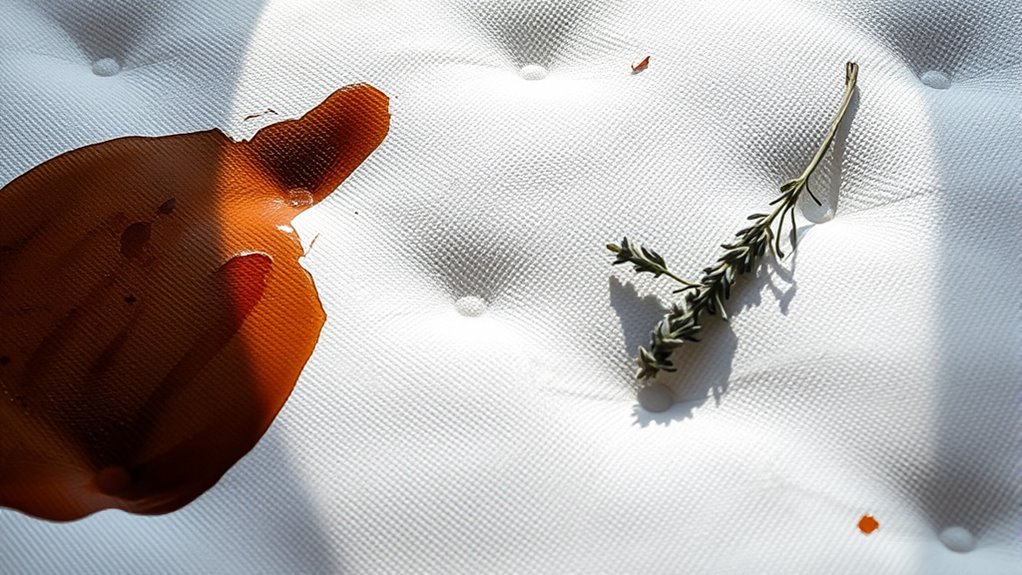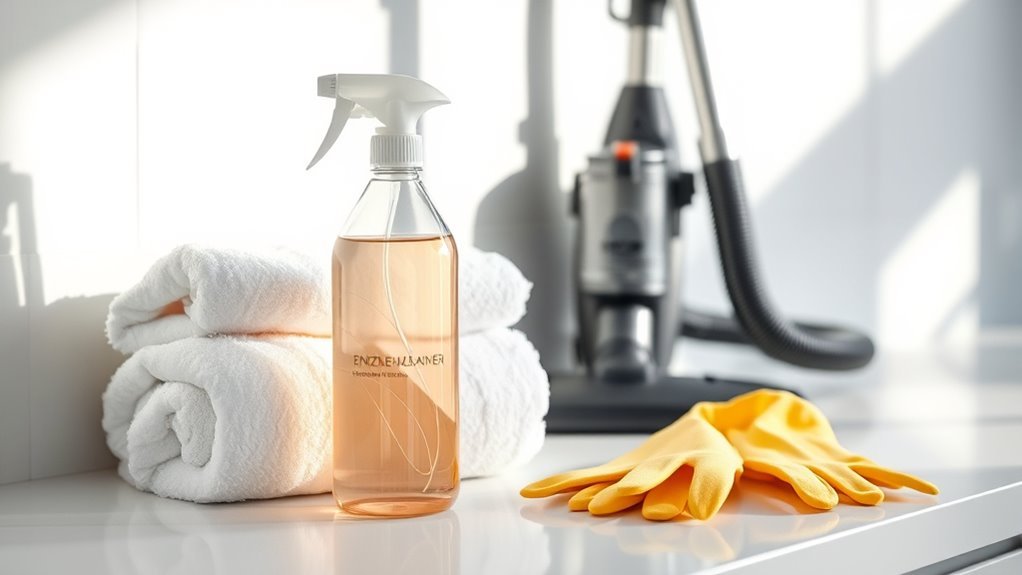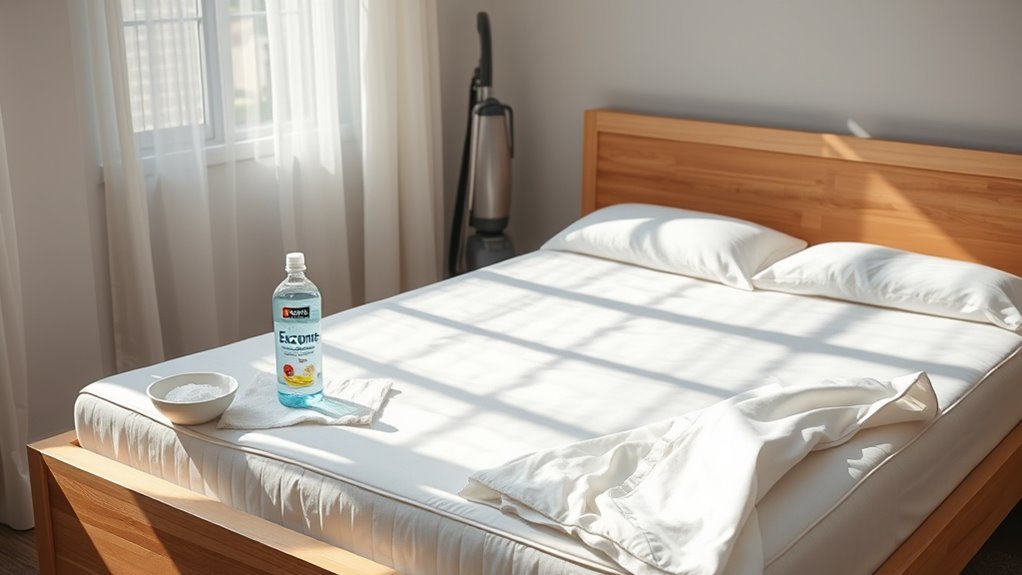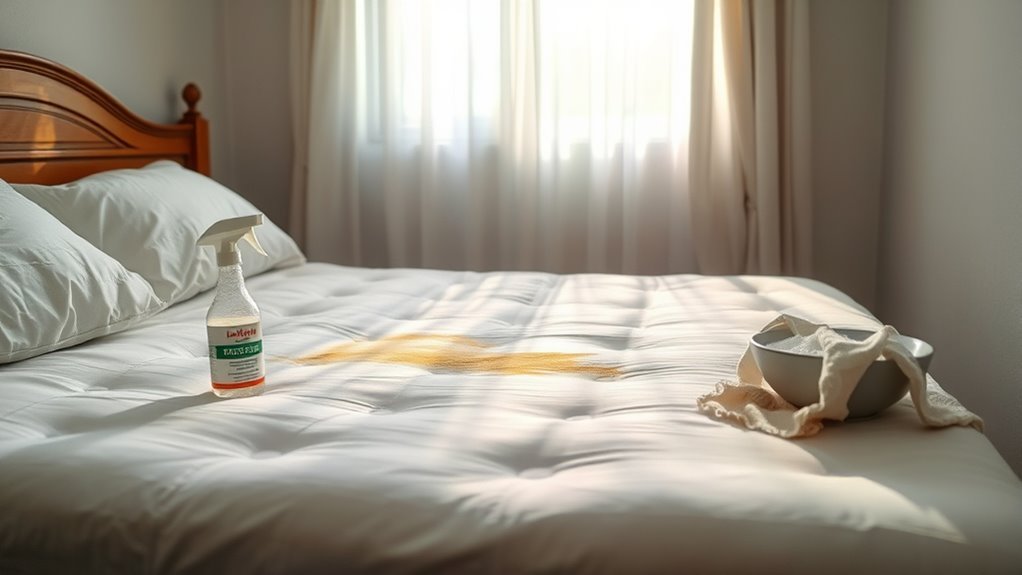To clean a mattress after bedwetting, first assess the damage by identifying the stain and any odors present. Gather supplies like an enzymatic cleaner, baking soda, and microfiber cloths. Start by blotting the area, then sprinkle baking soda to neutralize odors and apply your mattress cleaner for stain removal. Rinse with a damp cloth and let it air dry. To further freshen your mattress and prevent future accidents, consider some effective preventative measures. Discover more insights ahead!
Assessing the Damage: Evaluating the Stain and Odor

Before diving into the cleaning process, it’s essential to assess the damage by evaluating both the stain and the odor. Start by identifying the mattress material, as different fabrics can react uniquely to cleaning methods. For instance, memory foam may require gentler treatments compared to traditional innerspring mattresses. Next, determine the stain type; is it a recent accident or has it set in over time? Fresh stains are usually easier to tackle than older, more stubborn ones. Also, take note of any lingering odors that can result from the stain. Understanding these factors not only helps in choosing the right cleaning approach but also guarantees you effectively restore your mattress to its original, fresh state.
Gathering Your Cleaning Supplies

Once you’ve assessed the damage to your mattress, it’s time to gather your cleaning supplies. Depending on your mattress types, you’ll need specific cleaning solutions to effectively tackle odors and stains without causing harm. Here’s what you should collect:
After assessing mattress damage, gather specific cleaning supplies to effectively address odors and stains without causing harm.
- Enzymatic cleaner: This breaks down urine effectively and neutralizes odors.
- Baking soda: A natural deodorizer that can help absorb residual moisture and smells.
- Microfiber cloths: These are gentle on your mattress and ideal for blotting and applying cleaning solutions.
Having these supplies on hand will guarantee you’re ready to jump into the cleaning process confidently. Remember, using the right products is key to preserving your mattress and maintaining a fresh sleep environment.
Step-by-Step Cleaning Process

As you prepare to tackle the task of cleaning your mattress after bedwetting, it’s essential to follow a systematic approach to guarantee effective results. Start by stripping any bedding and checking your mattress materials for specific cleaning techniques. Blot the area with a cloth to absorb moisture, then sprinkle baking soda to neutralize odors.
| Step | Action |
|---|---|
| 1. Blot the area | Use a clean cloth to absorb moisture |
| 2. Apply cleaner | Use a suitable mattress cleaner |
| 3. Rinse and dry | Wipe with a damp cloth, then air dry |
Once it’s dry, you’ll have a fresh mattress ready for use again. Following these steps guarantees you maintain the quality of your mattress.
Deodorizing Your Mattress
Deodorizing your mattress is essential for maintaining a fresh sleeping environment, especially after an accident. You want to eliminate any lingering odors, and there are effective methods to do this. Start by sprinkling a generous amount of baking soda over the affected area. Baking soda is a natural deodorizer that absorbs unpleasant smells. For an added touch, mix in a few drops of your favorite essential oils to the baking soda before applying it. This not only masks odors but also leaves a pleasant scent.
Deodorizing your mattress with baking soda and essential oils can effectively eliminate odors and refresh your sleep space.
- Use lavender for relaxation.
- Try eucalyptus for a revitalizing aroma.
- Opt for tea tree oil for its antimicrobial properties.
Let the mixture sit for several hours, then vacuum it up to reveal a revitalized mattress.
Preventative Measures for Future Accidents
Maintaining a fresh mattress is important, but taking steps to prevent future bedwetting accidents can save you time and effort in the long run. Start by investing in high-quality mattress protectors; these act as a barrier, keeping moisture away from your mattress and making cleanup easier. Establish consistent nighttime routines to help your child feel more secure and relaxed before bed. Encourage bathroom visits just before sleep and limit fluid intake in the evening. You might also consider using training pants during this developmental phase. Be patient and supportive; accidents can happen, but with the right preventative measures in place, you can foster confidence and independence while protecting your mattress.
Frequently Asked Questions
Can I Use Bleach to Clean My Mattress?
No, you shouldn’t use bleach to clean your mattress. It can damage the fabric and foam, compromising mattress safety. Instead, consider bleach alternatives like vinegar or baking soda, which effectively eliminate odors and stains without harsh chemicals. These options are safer for your health and the environment. Always check your mattress care label for specific cleaning instructions, ensuring you preserve its lifespan while maintaining a fresh and clean sleeping surface.
How Often Should I Clean My Mattress?
You should clean your mattress at least every six months to maintain its hygiene and comfort. Regular mattress maintenance helps prevent dust mites, allergens, and odors from accumulating. If you’ve had spills or accidents, you might want to increase your cleaning frequency. Vacuuming the mattress and using a mild cleaner or protector can extend its life. By staying on top of this, you’ll enjoy a fresher, healthier sleeping environment.
Is It Safe to Use Essential Oils on My Mattress?
Using essential oils on your mattress can be safe and beneficial. Picture a serene lavender field; those essential oil benefits can freshen your space and aid in mattress odor removal. Just make certain you dilute the oils properly and use them sparingly. A few drops on a cotton ball or in a diffuser can create a calming atmosphere without overwhelming scents. It’s a delightful way to rejuvenate your sleep sanctuary and embrace a peaceful night’s rest.
What if the Stain Doesn’t Come Out Completely?
If the stain doesn’t come out completely, don’t worry; there are still options. Try using various stain removal techniques like baking soda, vinegar, or specialized mattress cleaning products. Allow them to sit for a while before blotting. You might also want to repeat the process a couple of times, as some stains require persistence. Remember, a bit of discoloration might not be noticeable under sheets, so focus on keeping your mattress fresh.
Can Bedwetting Cause Permanent Damage to the Mattress?
Yes, bedwetting can potentially shorten your mattress lifespan if not addressed quickly. Regular cleaning techniques, like using enzymatic cleaners and ensuring thorough drying, can help mitigate damage. However, persistent moisture can lead to mold and odors, which are harder to eliminate. To protect your investment, consider using a waterproof mattress protector, as it can shield against stains and prolong the life of your mattress, giving you peace of mind.



